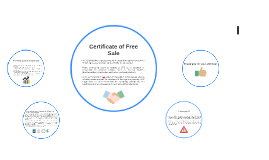Certificate of Free Sale
Transcript: • Lack of Probative Value – Example: FDA regulates the manufacturing body who exports within laws and regulations, but gives no assurances about the product itself) • Increased costs and barriers to trade – Emitting and obtaining CFS increases the cost of the good. Also updating and renewing CFS can act as a costly trade barrier. • Competitive concern – Economies of scale – Differences in standards for each importing country reduces the possibility of the economies of scale for exporting producers. • Issues related to the origin, manufacturers and producers of the products as discussed earlier. • Transit issues – When importing country requires two CFS, one from the exporting country and if there is any, one from the transit country that the good crosses through, making it more burdensome. • Delay – Issuance, translation and notarization schemes of a CFS can take a long time and can seriously delay the process of import/export Problems with CFS Certificate of Free Sale A CFS states that a product meets the regulator requirements of the exporting country and can be sold freely in that country. Many developing countries require a CFS as a condition of importation in sensitive sectors, such as medical devices, pharmaceuticals, pesticides, cosmetics, and food products. CFS is different from pre-shipment inspection, which usually checks whether products meet the standards of the importing country. CFS regulations are directed towards the exporting country and the requirements are not based on importing country’s standards. Thank you for your attention From developed country’s perspective, CFS gives rise to the following concerns: At the root of the CFS debate is the legitimate desire of developing countries to find a cost-effective way to screen the quality of imports without having to establish their own domestic regulatory machinery. Because of differences in regulations and rules in different countries, CFS acts as an unofficial trade-barrier when importing countries require products to meet standards of both the importing, and the exporting country Why developing countries require CFS? Consumer protection, environmental, health and safety grounds Regulatory, technical hurdles and cost factors. Legal grounds (non-responsibility for safety of the products and goods) Transparency (some countries lack resources to identify Domestically Prohibited Goods) Cost and Protectionism (higher costs give advantage to domestic producers, market manipulation)

















